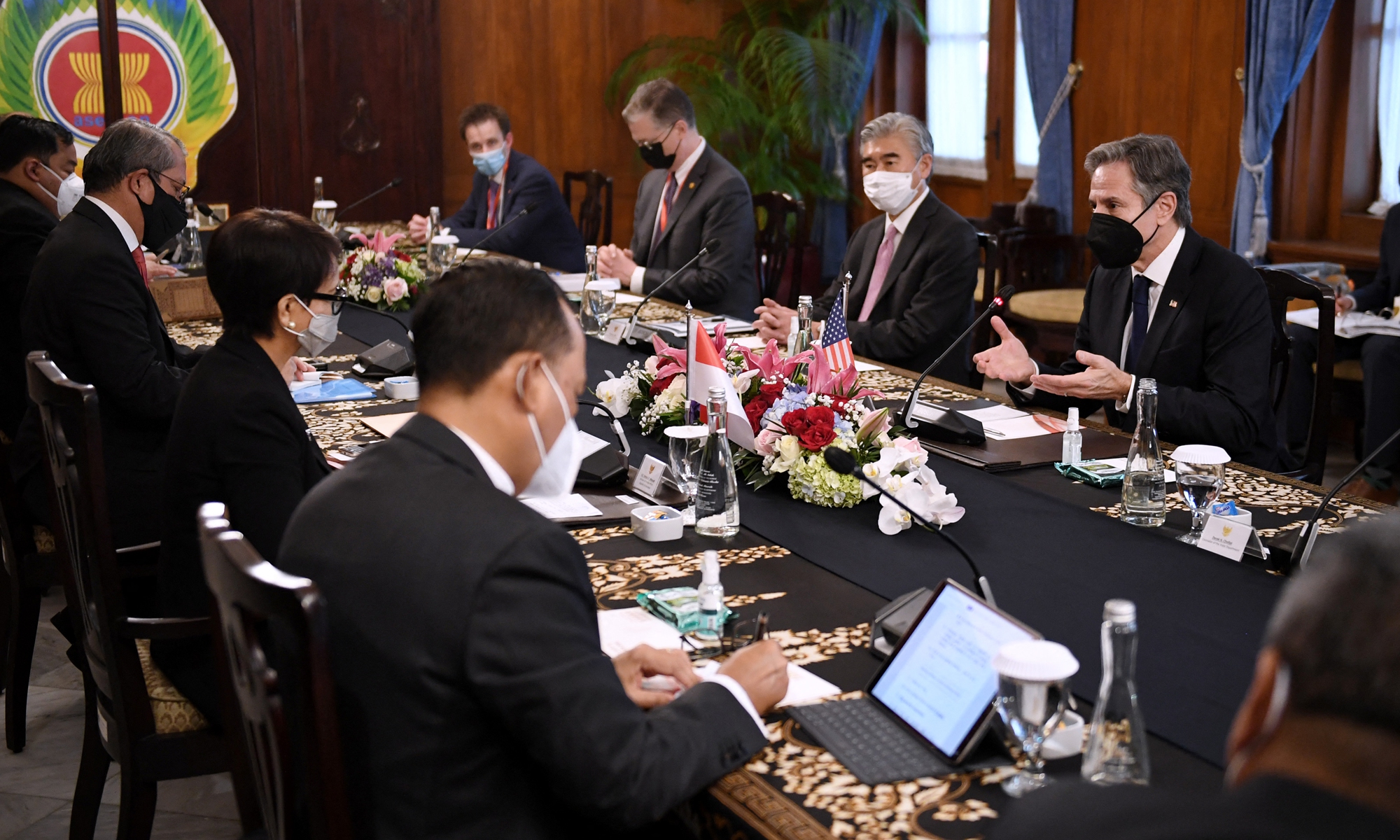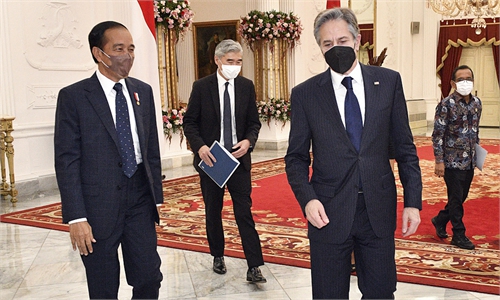Blinken in futile attempt to drive wedge in SE Asia
Beautiful rhetoric disguises aim to use region to contain China: experts

US Secretary of State Antony Blinken (right) meets with Indonesian Foreign Minister Retno Marsudi (second left) at the Pancasila Building in Jakarta on December 14, 2021. Blinken promised to enhance economic and security cooperation with the region. Photo: AFP
US Secretary of State Antony Blinken could not wait to sabotage China's relations with Southeast Asia in his speech on Tuesday in Jakarta, Indonesia, by hyping disputes over the South China Sea and China's "threats" to the regional economy, as he promised to enhance economic and security cooperation with the region.
China's "aggression" in the South China Sea threatened more than $3 trillion in annual trade and is a cause of growing concern. "That's why there is so much concern - from Northeast Asia to Southeast Asia, and from the Mekong River to the Pacific Islands - about Beijing's aggressive actions," Blinken claimed in a speech at the University of Indonesia.
Blinken said that the US "will advance a free and open Indo-Pacific" in which "problems will be dealt with openly, rules will be reached transparently and applied fairly, goods and ideas and people will flow freely. "
If the US really wants to play a constructive role in promoting peace and development in the Asia-Pacific region as it claimed, it should earnestly respect the ASEAN-centered regional cooperation architecture, instead of drawing ideological lines, creating small cliques and inciting bloc confrontation, Chinese Foreign Ministry spokesperson Wang Wenbin said Tuesday in response to Blinken's speech.
It should respect the efforts made by China and ASEAN members to maintain peace and stability in the South China Sea, instead of frequently sending vessels and aircraft to the South China Sea to flex muscle and provoke trouble. It should be a promoter of dialogue and cooperation in the region, instead of a saboteur that drives wedges between regional countries and undermines regional solidarity and cooperation, Wang said.
While trumpeting the so-called "China threat," the US said it does not want conflict with China. Such a self-contradictory approach is not in line with the spirit of the meeting between Chinese and US heads of state and will hardly be recognized by countries in the region, Wang noted.
No matter what rhetoric he uses, experts noted that the region would maintain rationality in handling relations with China and the US in terms of regional interests as they are clear that the US intends to use them as strategic tools to contain China.
Those beautiful slogans of "democracy," "rules" and "freedom" are just a disguise of the US' ill-intentioned strategy to amplify and provoke regional disputes to allow it to engage in deeper interference in the region and make regional countries rely more on the US, observers said.
The US thinks Indonesia is one of the most powerful countries with disputes with China over the South China Sea, but it miscalculates as Indonesia would not want to become a "battlefield" for China-US competition, Zhuang Guotu, head of Xiamen University's Southeast Asian Studies Center, told the Global Times on Tuesday.
Zhuang said that Blinken's speech is "nothing new" from what he said during his trip to Japan and South Korea.
The South China Sea card would be played even more severely after Blinken moves from Indonesia to Malaysia, Chen predicted, noting that these countries, however, would stay reasonable facing the US' provocation.
Some foreign media hyped a "standoff" between a Chinese government research ship and an exploration vessel operated by Malaysia's state oil company Petronas in the South China Sea in April 2020, while two US warships were operating in the South China Sea and claiming that China was "bullying" others in the region.
However, China and Malaysia denied any "standoff" between the two sides. Malaysian officials also told media that the appearance of US warships in the region would lead to misjudgments and affect regional peace and stability.
Media and observers also poured cold water on Blinken's visit before his arrival.
A report by Reuters on Monday also exposed the US' lip service on economic cooperation with Southeast Asia, pointing out that the US had shown its desire to step up engagement with Southeast Asia through a series of senior-level visits this year, but they don't have a response to China on the economy.
And even as Blinken is expected to woo countries by dangling the prospect of hosting US firms relocating from China as part of efforts to secure sensitive supply chains, there was no sign of a willingness to offer an increased access to the US market the region craves, the article said.
China is the most important country around Indonesia and the two countries' economic cooperation has progressed smoothly such as the construction of the 21st Century Maritime Silk Road. Many previous US administrations and officials, like the Trump administration and Obama administration had drawn big pies for Indonesia, but which were not real after all. Indonesia knows that cooperation with China is more pragmatic and fruitful than relying on the US, Zhuang said.
It is practically impossible for the US to cooperate with Southeast Asian countries without China as the region has to import many items like cotton and electronic products from China, Chen Xiangmiao, assistant research fellow at the National Institute for South China Sea Studies said.
Besides economic cooperation, China and ASEAN are also enhancing exchanges on security issues in recent years to deal with mutual concerns and regional disputes, which experts said would further help enhance mutual trust between China and ASEAN and solve regional disputes through negotiations, leaving little space for the US to provoke.


